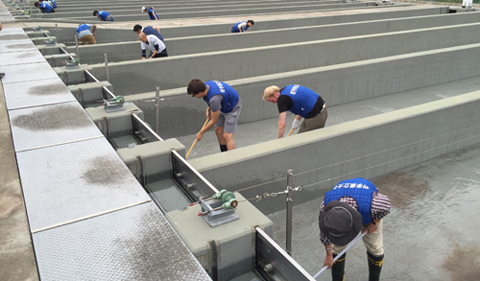
From left, in the foreground inside fish chute: OHIO Sophomore Nick Farris and Senior Ben Piper help to scrub clean the concrete fish-egg chutes at a local fish hatchery used to dispense fertilized salmon roe into a nearby river as part of the OHIO-IPU Tsunami Volunteer Project year six that took place on the Iwate coast on Sept. 24 and 25.
Ben Piper ’17 and Nick Farris ’19 participated in year six of the OHIO – Iwate Prefectural University Tsunami Volunteer Project in Japan on Sept. 24 and 25.
Both students are currently on OHIO’s Chubu University Japanese Language Study Abroad Program in the city of Kasugai (near Nagoya) in Aichi Prefecture (central Honshu). They were already in Japan, but their travel to Iwate Prefecture and ability to join “year six” was made possible by donations from the Ohio University Alumni Association’s Japan (Tokyo and Nagoya Chapters), which covered the students’ long-distance transportation to Iwate, food and lodging. Significant local support also was provided by IPU.
Early on the morning of Sept. 24, Piper and Farris flew from Aichi with Chubu Assistant Professor and OHIO alum Greg King, to the inland Iwate city of Hanamaki, where they arrived at 8:30 a.m. Then, they were met by IPU professors Keiko Chiba and Tomomasa Sasa in a university vehicle for a rondezvous with OHIO’s Dr. Christopher Thompson, accompanied by Dr. Shiyong Wu in the nearby town of Towa.
Together, they proceeded on the two-and-a-half-hour trip to Iwate’s coastal towns of Ofunato and Rikuzentakata, where they met-up with the rest of the Tsunami Volunteer group consisting of five IPU students and five non-Japanese college students representing the Honjo Foundation, the educational arm of Itoen (Tea Company), the project’s corporate sponsor, which has supplied bottles of water and tea samples for delivery to victims of the March 11, 2011, earthquake and tsunami that struck the region since 2012.
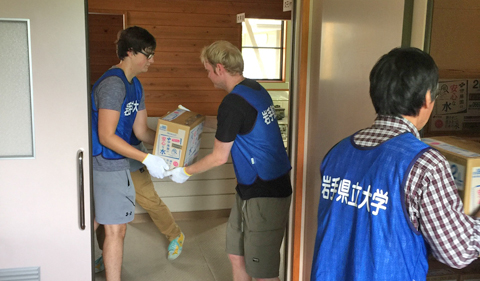
In the foreground inside the door frame: OHIO Sophomore Nick Farris and Senior Ben Piper help unload boxes of Itoen water and tea from a truck into a storage area as part of the OHIO-IPU Tsunami Volunteer Project Project year six.
Morning—Water | Afternoon—Fish Hatchery | Evening—Rapport
This first OHIO-IPU project of year six was more preparation-oriented than the outreach-focused visits to this local in the recent past, highlighting the long-term objectives of the collaboration. The morning was spent unloading more than 1,000 boxes of Itoen water and tea that the group delivers to neighborhoods on the Iwate coast still readjusting to life following, 3.11.11. With only a total of 15 participants available to lift boxes, it seemed to take forever to fill the designated storage facility with the Itoen-labeled product.
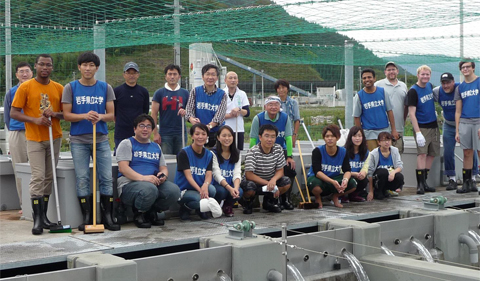
At the fish hatchery in Rikuzentakata, Iwate on Sept. 24: Far left wearing white shirt is OHIO Alum Greg King. OHIO’s Ben Piper, Dr. Christopher Thompson, and Nick Farris are standing next to him left to right. OHIO’s Dr. Shiyong Wu is standing in the background on the far left side.
In the afternoon, the group spent all of its time scrubbing down concrete fish-egg-chutes at a local fish hatchery used to dispense fertilized salmon row into a nearby river to rejuvenate the salmon population disrupted in 2011. Since it takes three years for the salmon to swim downstream, develop in the ocean, and swim back, this year’s efforts are aimed at a harvest expected during the local salmon season in 2019.
The evening was spent at a nearby camp ground called Fureai-Land (fureai in this context meaning “rapport building” in Japanese) where all participants enjoyed an outdoor barbecue and reflected on the day to renew and create new friendships and collegiality that form the foundation of this project.
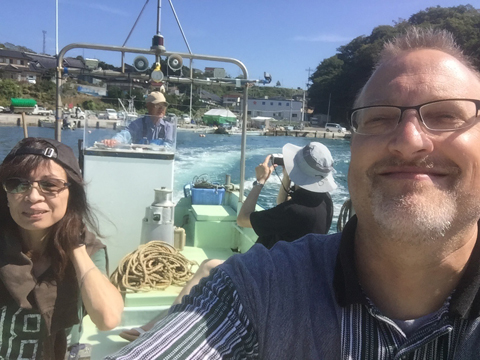
A selfie taken by Dr. Christopher Thompson, right, on a fishing boat off the coast of Nagasaki village, Iwate Prefecture. Thompson, Dr. Keiko Chiba, left, and Dr. Shiyong Wu (black shirt) were taken to scallop and seaweed beds offshore in the area by a local fisherman (driving the boat) on Sept. 25.
Preparing for IPU Faculty, Students to Come to OHIO
While most of the participants had to return to central Iwate to catch flights or trains back to their university homes in Tokyo and Aichi in the morning, Chiba took Thompson and Wu to the site of her ongoing field research on nutrition in Iwate’s coastal communities. In the village of Nagasaki (which suffered a direct hit by the 3.11.11 tsunami), Thompson and Wu learned about local scallop farming and how edible seaweed is produced by observing the cultivation methods of each both on land and in the sea.
Local fisheries personnel also treated Thompson and Wu to fresh examples of each. The 26th and 27th were spent with Chiba back in Morioka, where they visited IPU and the Iwate Prefectural Office. Particularly memorable were Wu’s visit to Chuba’s nutrition lab to discussed possibilities for her to visit OHIO as a guest researcher, and Thompson meet with the nine IPU students who will be studying English in OPIE on a short-term study abroad program in March of 2017.
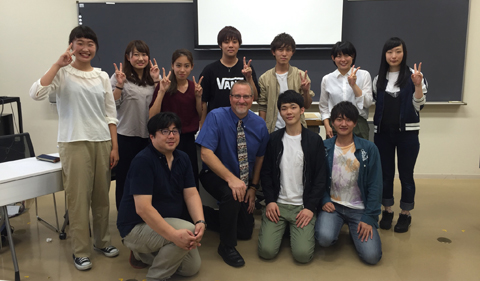
Dr. Christopher Thompson (blue dress shirt) with IPU’s Dr. Tomomasa Sasa (left of Thompson) and his nine student who will study English in OPIE in March of 2017. Next to Thompson, from left: Takahiro Kudo, Ryuji Kato. Back row, from left: Mebuki Araya, Minori Sasaki, Kyoko Sugawara, Fumiaki Murayama, Kenta Takahashi, Nodoka Ito,and Yuna Watanabe.
According to Thompson, these two outcomes are only the tip of the iceberg in terms of the meaningful and tangible outcomes both OHIO and IPU have experiences as a result of the Tsunami Volunteer Project so far. While eight OHIO faculty and administrators have visited IPU since 2011 so far, six from IPU have visited Athens during the same stretch of time, while two more are expected with the student visit to OPIE next year.
Thompson already has connected these IPU students with his Japanese Learning Community students at OHIO, which has resulted in a slew of email exchanges already, and perhaps even a date for a group Skype session. Several other collaborations and program ideas are in the works. Thompson, a cultural anthropologist who specializes in the folk culture of Iwate prefecture, also hopes to introduce some of Iwate’s folk culture performance groups to OHIO in the near future. Year seven of the OHIO – IPU Tsunami Volunteer Project is expected for next year.



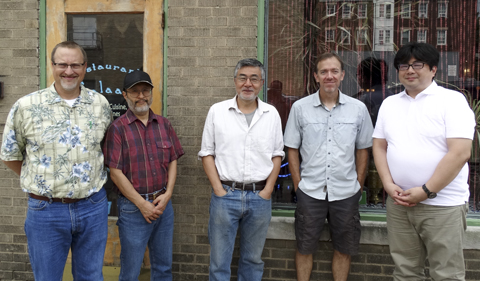















Comments